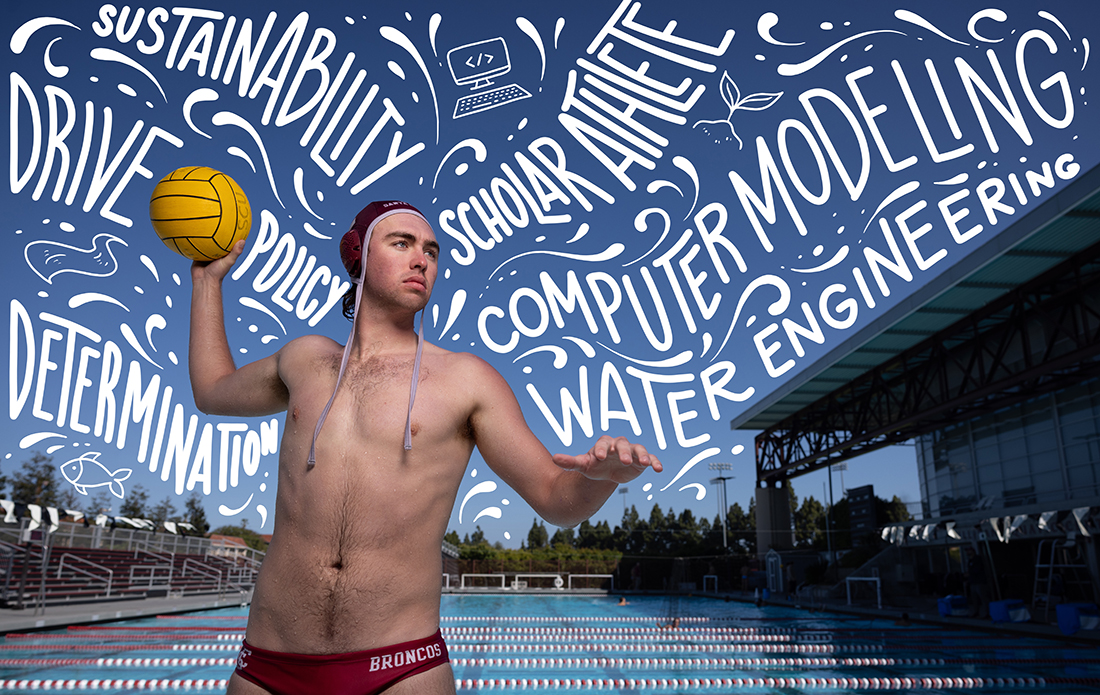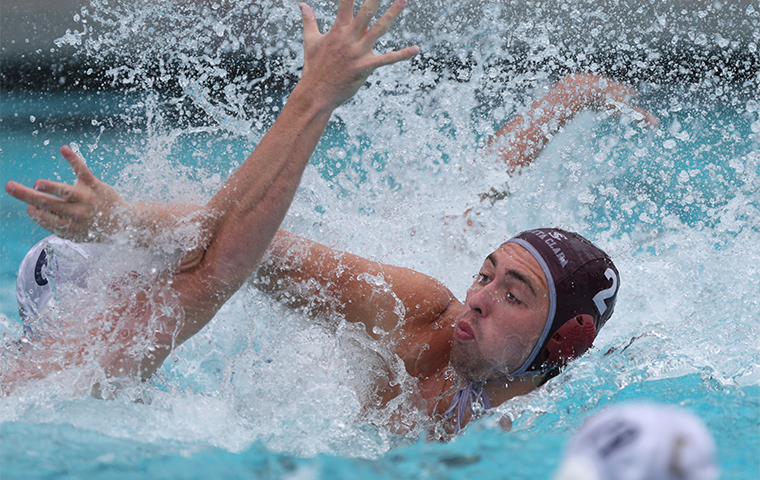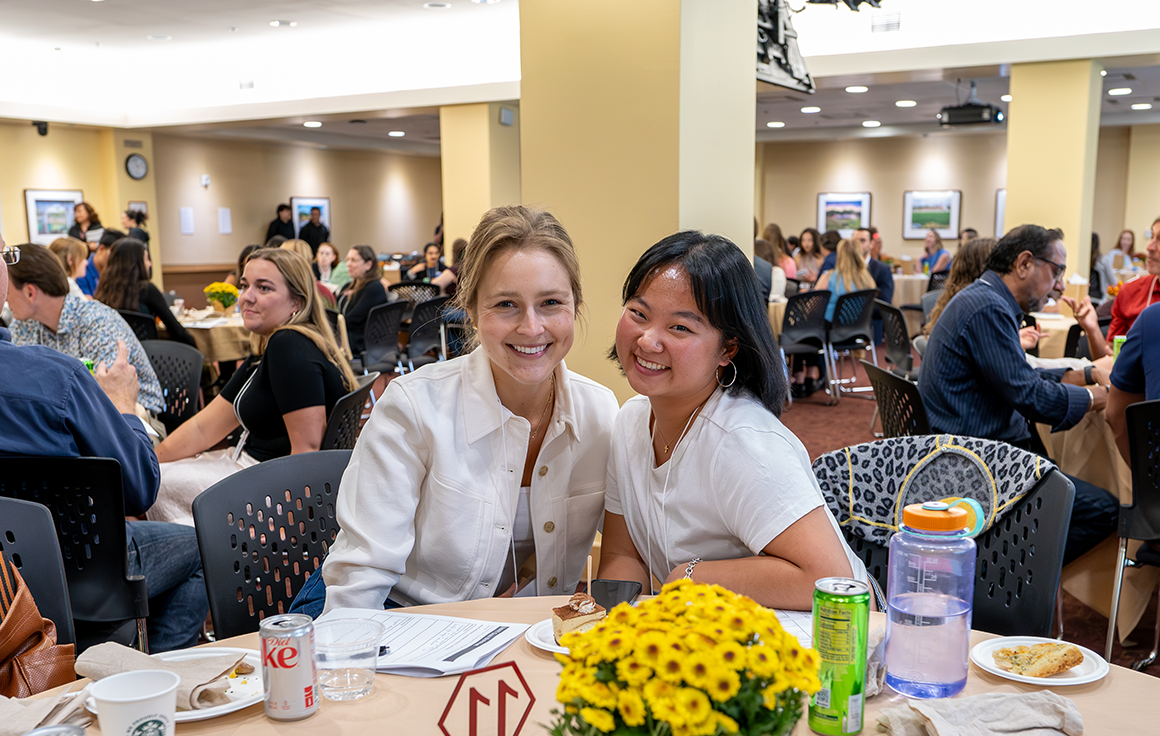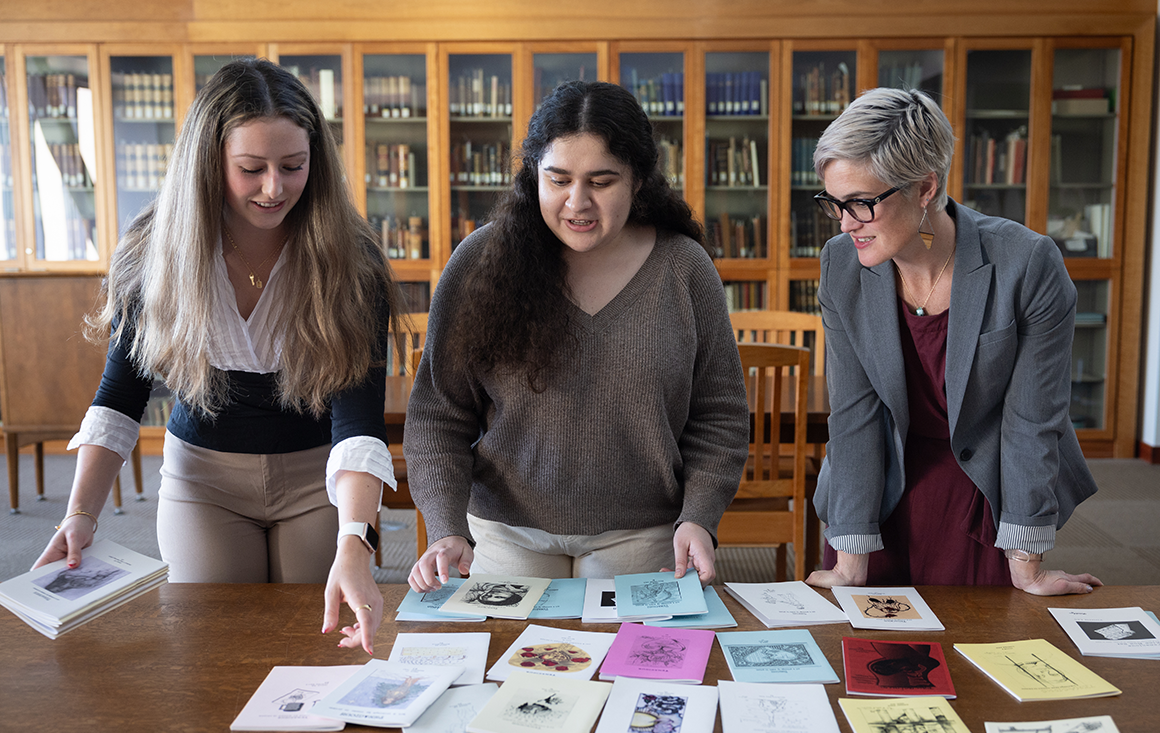Cody Ferguson ’24 Plunges Into A Bright Future

Eat. Sleep. Water polo. Repeat.
For much of the last four years, that’s been the mantra for Cody Ferguson ’24, who as a center forward on the Santa Clara men’s water polo team has been one of the main offensive players.
Positioned directly in front of the opponent’s goal between the 2-meter and 4-meter lines of the Sulliva Aquatic Center pool, Ferguson has earned the nickname “the 2-meter man” from his teammates for his renowned skill at scoring goals.
But while the grueling and physical sport has been a lifelong passion, his academic objectives as a civil engineering major were never far behind.
Though the pandemic interrupted Ferguson’s journey to Santa Clara, by the time he arrived on campus in winter 2021, he was already soaking up new concepts that would lead to his growing interest in water engineering and a career helping to create sustainable water systems.
Last year, Ferguson won the Wil A. Vicik Memorial Endowed Scholarship, given to a junior majoring in civil, environmental or sustainable engineering who shows the most promise for a successful career as a civil engineer.
In December, he was named to the West Coast Conference’s first-ever Men’s Water Polo All-Academic Team.
This fall, Ferguson heads to Stanford University for a master’s degree program in environmental engineering that he hopes will bolster his future as a water engineering consultant.
We talked with the Sacramento-born and raised scholar-athlete about his SCU experience, what he learned about himself, and what he’ll remember most from his time on the Mission campus.
What inspired you to study civil engineering?
Growing up, I was always interested in math, and later in high school, physics. I was like, “Oh, this is something I’m good at,” so I definitely wanted to go into engineering based on my skill set. I also wanted to go to college to do something technical, and civil engineering seemed more concrete than some of the other types of engineering because a lot of it is physical, like building bridges. But over time, I’ve gotten less interested in that aspect and more interested in the less tangible aspects of civil engineering, like water and the environment.
You hope to become a water engineering consultant. What does that entail?
It’s about helping clients make better decisions for the future regarding sustainable water use, making sure there is enough water for people, obviously, but also for agriculture, and the environment. It’s a lot of math and numbers and difficult equations, and I enjoy that. I like coming up with creative solutions that might not have been thought of before.
You’re using data analysis and computer modeling and critical thinking to solve a problem or make recommendations for a city, for example, that wants to build or develop something, or irrigation for farmers, or balancing habitats for fish. Essentially, it's focusing on future-proofing our water supply in California, and informing policy that will help create sustainable water systems.

A precipitation map Cody Ferguson created using spatial analysis software.
What brought you to Santa Clara?
Mostly water polo. I had a really good conversation with our coach, Keith Wilbur, and I’d heard very good things about the program; I got a partial water polo scholarship, which was helpful. I also liked the idea of a private school with small class sizes, and the ability to connect with professors.
It was important to me to have a wide range of courses, especially some of the core classes we’re required to take, that help you develop as a person. The technical stuff is important, but that’s only going to be a tiny part of the actual work a person does. There’s much more to being a good engineer—the ethics aspect, the social justice aspect. Taking those classes really opens your eyes.
You’ve played competitive water polo since age nine. How much does it inform who you are?
Well, I like that it’s competitive, and that you have to push yourself to your physical limits. You’re basically trying to overpower someone in the pool. But there’s a lot of technical stuff, too; you have to use your brain to think about plays, which can be complex, and it’s also pretty fast-paced, especially at the college level. It takes up a lot of your time, like 20 hours a week in the fall, and 10 to 15 hours in the spring. But it also helps to keep you focused on doing well in school.
Looking back, who do you count as some of your favorite SCU professors, and why?
First, Professor Reynaud Serrette. He was definitely the hardest civil engineering professor. His classes are known for being really, really difficult, and it’s definitely true; the homework was hard, and the tests were just insane. But when I look back on those classes, they’re also the most important and foundational classes for an undergraduate civil engineer. They made all of us prove that we’re actually capable of doing engineering. And after taking his classes, he’s always been a good resource for me to talk about engineering. I graded homework for him last year in one of his sophomore classes.
Another person is Professor Aria Amirbahman, especially for his mentorship. I’ve gone to talk to him about graduate school a lot and he’s given me good insights on how to think about my future, and he kind of convinced me that graduate school would be a good decision. Both of these people wrote recommendation letters for me, and I’m super grateful to them.
I’d also add Fr. Rob Scholla. I took two religion classes from him; one was about Jesus and his history with respect to the gospels, and the other was about Ignatian spirituality. I’ll remember him because he brought humor to his classes. A lot of the readings were about philosophy, and sometimes hard to understand. But he made it interesting.
Any particular class that stood out for you?
There was a water law class last spring taught by two practicing attorneys, David Sandino ’84, J.D., and Wesley Miliband. I don’t know if that’s common for other engineering programs to teach a course like that. It covered a lot of the California Environmental Quality Act and groundwater sustainability, how the California water problem evolved, what laws have been put in place since the 1970s up through today, and how that is going to affect the future of water going forward. I wish I could have done an environmental sciences minor, but that was just not feasible with water polo. Water polo player Cody Ferguson holding off the competition. 
What’s a fond memory you’ll take with you after graduation?
During COVID, athletes were allowed to move into the dorms in the middle of the 2021 winter quarter. They put some of the guys from the men’s water polo team in single rooms in Campisi, along with the men’s rowing team. For a while, because we were all living in this COVID bubble in the dorms, we technically couldn’t hang out with anyone outside of the dorms. So we ended up practicing with the women’s water polo team; we could get into the pool and do something exciting instead of sitting in the dorm all day. It was pretty fun, and we’re still good friends with them. I don’t think that had happened before us, honestly, so that connection has been good for the program.
What is something that you’re proud of?
In my sophomore year, I won MVP Second Team All-WWPA (Western Water Polo Association), which was cool because it was the first season I played at Santa Clara, since I hadn’t been able to do that as a freshman for the full season. It was nice to see some payoff, or recognition, for the 10 years or so of work that I’d put into water polo before that point.
Winning the civil engineer award was really cool, too, because that kind of validated all the hard work I’d done in the classroom.
If you could offer any advice to prospective students considering attending Santa Clara, what would it be?
My number one piece of advice is that you’re going to have a way better time with our professors than a lot of the other professors at bigger universities. Because it’s a smaller environment, I think our professors care a lot more for their students. They care how you are doing in your classes. They’re not just here to deal with graduate students.
And because we’re smaller, you get way better resources. The facilities are pretty top-notch, and it’s epic with SCDI just being built. Plus, the campus is beautiful and the weather is good.
Creating innovative ways to build and improve infrastructure in the face of climate change and increasing urbanization.


